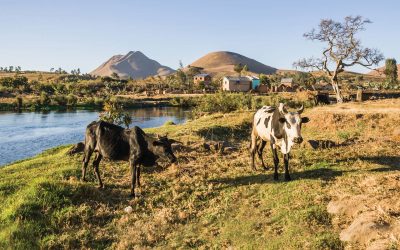For most of us turning on a tap and being able to drink the water, or taking a cleansing shower or bath, is so ordinary we barely think about it. But we also know, this would be a genuine luxury for millions of people in much of the world and in Zambia one charity, Village Water, has established successful projects to create fresh water sources and sanitation to one hundred villages.
Often, with the support of donations from Rotary clubs in the UK, as well as money raised from other sources such as their annual Christmas appeal, ‘The Big Give’, this determined charity team of UK based and ‘in country’ people have ambitious goals and are achieving them fast.
Thanks to donations received by Village Water, the gift of safe water, bathing and sanitation is making a difference to thousands of lives already and is making a significant contribution to the economic future of local people who become associated with the projects.
It is also giving proof positive to the Zambian government that external support can be beneficial and permanent, when you add a strong element of self-help and business potential into the bargain.
Village Water was established by Rotarian David Dixon, who has a professional background in the water industry. In 2003, David spent time in Zambia and during that holiday visited a local clinic to see for himself what conditions were like.
Having been told that half of the local children would not reach their fifth birthday due to local conditions, David returned to the UK and began fundraising with family and friends, raising enough money to repair twenty water points.
It was a true success, but he also recognised the holistic needs of sanitation if the situation was to be improved long term and the importance of local people working together to achieve and maintain it.
By 2006 Village Water had received charity status in the UK and Village Water Zambia became recognised as a charity in 2007 in its home country. As a member of the Rotary Club of Ironbridge, David Dixon took his professional expertise and used it to take an almost holistic approach to the challenges of providing clean water and sanitation for communities that were suffering. Fellow Rotarians have consistently provided funding support and the list of clubs grows as time goes on.
Since 2003, more than 180,000 people in the Western Province of Zambia have seen their land, lives and communities enhanced through the work of Village Water, with support from many sources and with an increasing number of Rotary clubs adding their donations so that far-reaching projects can be delivered.
Day to day living, ongoing health and the economic opportunities are the ultimate legacy to be enjoyed by a healthy rural population in areas where disease, infant deaths and environmental challenges once ruled.
An essential factor in every project is involving local people.”
Thanks to Village Water and the active partnership with Rotary clubs across the UK, the work of this small charity is making its mark where it really matters.
Kirsty Mullock, Fundraiser for Village Water, explained: “Creating or repairing a well for clean water is far from simple in a land like Zambia. Due to the locations and soil quality in the villages where Village Water works, it is rare that mechanical well drilling can take place.”
“This is one of the reasons why the country’s government has focused more on larger projects where it is a matter of equipment power rather than manpower. By digging wells by hand, the ground is more manageable and the end results become more certain.”
“This approach means projects can be carefully planned to bring sanitation and improved hygiene to villages in which water-borne illnesses are rife – without false starts or money being wasted.”
“An essential factor in every project is involving local people and ensuring that District Monitoring Schemes are effective in the delivery of every project’s goals.”
Recently, the Monifieth & District Rotary Club received a Rotary Foundation Award for their support for two projects in Zambia’s Western Region.
The two Village Water projects the Monifieth & District Rotary Club supported literally changed the lives of 355 people in two villages in the Western Province – Kalwizhi and Kawi. The impact of that support has been recognised with the presentation of a Foundation Award by Rotary to the club.
The project was in response to a report in August 2015 that showed a staggering 22% of people in those villages were suffering from diarrhoea and 33% had eye infections, with many suffering from scabies, too.
Following the report, money from the Rotary Club of Monifieth & District was used to create new wells in the villages and two local water committees were set up to oversee the changes and organise a water pump maintenance rota. Funds were also provided so that spares and repairs were readily available.
Kirsty commented: “It is this ‘future planning’ that is a key element in every Village Water project – each has a reach and longevity that will continue to benefit the children of today and their parents, but also the health and wellbeing of those generations as time goes on.”
However, like all Village Water projects, it was not just about providing a clean water source. Before the project, there were no latrines in the villages and the sandy ground had meant unsupported latrine walls collapsed.
Following the introduction of a system based on two plastic barrels, the problem was solved.
Each project has a longevity that will continue to benefit the children of today… but also the wellbeing of those generations as time goes on.”
The cost/benefit ratio of Village Water projects is staggeringly impressive.
The cost of the charity’s Water, Sanitation and Hygiene (WASH) projects to provide hygiene training, sanitation and safe water to a community of about 160 people is £4,100.
Compare this amount with the rates of illness, infection and infant mortality that previously impacted on the Zambian villages and it is easy to see the clear benefits of cost-effective Village Water projects.
That works out to just £25 for each person being given a healthier, better quality of life.
Another highly successful project, again supported by donations from several Rotary clubs, was to improve the sanitation at Kamihata School in the Western Province, which is the core area Village Water operates in currently.
Parents in the village had established the school in 2007 and by 2015 it had grown to have three classrooms and three teachers, and in 2016 thanks to donations from Rotary clubs and a grant from the Chrysalis Trust it was possible to build two permanent latrine blocks – one for girls, one for boys – as well as a bath shelter for girls and latrines for teachers.
The permanent sanitation facilities meant that the girls could stay in school longer and a more dignified and private toilet was available for children to use. Not only did these essential improvements make life better for the teachers and students, its increased facilities also made it more likely that local authorities could be successfully approached to provide more teachers and more resources.
Besides the direct benefits, the long-term intentions of every Village Water project are simple, as Kirsty explains: “Our goal is to improve health, education and economic development. We engage, train and equip local people in manual drilling teams ‘in country’.”
“With the training and practical experience gained during local projects, people can do two things that are important. They maintain the new wells and sanitation, but they can also use their new expertise to set up companies and bid for contracts similar to the ones they have already successfully delivered with our support and on our behalf.”
Village Water currently raises approximately £500,000 a year and keeps its in-house costs low with an amazingly small but highly focused team of 4-5 people.
Most recently, the Village Water Christmas appeal broke its own record with over £85,000 being raised over a three-day event. With a dedicated match fund pot, generous private donors, the total continued to climb. Rotary clubs also donated thousands of pounds from across the UK.
To take one example from many, Tormohun Rotary Club donated £2,050 which, with matched funding, produced £4,100 – enough to support an entire village project in 2017.
Claverhouse Rotary Club have funded the repair of four broken water points bringing safe water back to four villages. Each village has approximately 150 people living in it, so this is a major improvement to the communities.
Thanks to the generosity of Rotary clubs across the United Kingdom, Village Water is continuing to expand its work in village projects in Zambia and also has plans to extend its health and life saving activities into Mozambique.


























































